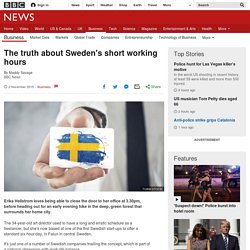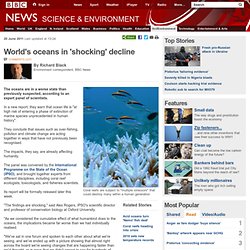

Freedom House. The truth about Sweden's short working hours. Image copyright Thinkstock Erika Hellstrom loves being able to close the door to her office at 3.30pm, before heading out for an early evening hike in the deep, green forest that surrounds her home city.

The 34-year-old art director used to have a long and erratic schedule as a freelancer, but she's now based at one of the first Swedish start-ups to offer a standard six-hour day, in Falun in central Sweden. It's just one of a number of Swedish companies trialling the concept, which is part of a national obsession with work-life balance. "For me it's absolutely fantastic," Erika says. "I have more spare time to train or to be outdoors while it is still daylight, or to do work in my garden.
" She has no children of her own, but enjoys being able to spend more time with friends and relatives and feels "much less stressed" since her hours were cut. "It's difficult to concentrate at work for eight hours, but with six hours you can be more focused and get things done more quickly," he says. “She should just be silent”: the real roots of India’s rape culture. Three years after a horrific gang rape in Delhi brought global attention to India's sexual assault epidemic, a new documentary has quoted one of the rapists saying something so inflammatory that it has provoked a whole new wave of outrage.

"A girl is far more responsible for rape than a boy," Mukesh Singh, one of the six rapists convicted in the 2012 attack, says in the documentary, because "a decent girl won't roam around at 9 o'clock at night. " "Housework and housekeeping is for girls," he claimed, "not roaming in discos and bars at night doing wrong things, wearing wrong clothes. About 20 percent of girls are good. " If women are not "good," he said, men have a right to "teach them a lesson" by raping them. And if that happens, the woman being raped has a responsibility to silently accept the assault. Meet Red October: The Global Cyber-Espionage Ring That Spent 5 Years in the Shadows. Carbon emissions paving way for mass extinction in oceans.
Ocean acidification growing at a rate faster than anytime in 300 million years.

To the left a discoaster of marine plankton before an ocean acidification event 56 million years ago, and to the right its counterpart corroded by ocean acidification event. Image taken with a scanning electron microscope (SEM). Human emissions of carbon dioxide may be acidifying the oceans at a rate not seen in 300 million years, according to new research published in Science.
The ground-breaking study, which measures for the first time the rate of current acidification compared with other occurrences going back 300 million years, warns that carbon emissions, unchecked, will likely lead to a mass extinction in the world's oceans. Acidification particularly threatens species dependent on calcium carbonate (a chemical compound that drops as the ocean acidifies) such as coral reefs, marine mollusks, and even some plankton. Nearly a third of the world's carbon emissions ends up in the oceans. Related articles. Walled World.
World's oceans in 'shocking' decline. 20 June 2011Last updated at 13:24 By Richard Black Environment correspondent, BBC News Coral reefs are subject to "multiple stressors" that could destroy many within a human generation The oceans are in a worse state than previously suspected, according to an expert panel of scientists.

In a new report, they warn that ocean life is "at high risk of entering a phase of extinction of marine species unprecedented in human history". They conclude that issues such as over-fishing, pollution and climate change are acting together in ways that have not previously been recognised. The impacts, they say, are already affecting humanity. The panel was convened by the International Programme on the State of the Ocean (IPSO), and brought together experts from different disciplines, including coral reef ecologists, toxicologists, and fisheries scientists. Its report will be formally released later this week. Fast changes This increases the amounts of these pollutants that are consumed by bottom-feeding fish.